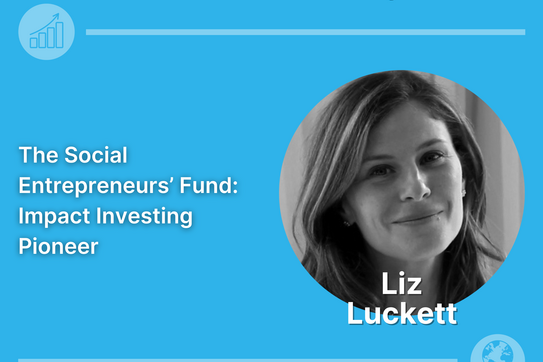In this episode of Capital for Good we speak with Liz Luckett, ’90CC, the managing partner of The Social Entrepreneurs’ Fund, and a co-founder of Maycomb Capital. A pioneer impact investor who has blazed the trail, and set a very high bar, for the billions of dollars and many new entrants to the field, Luckett shows us how to build a world with greater access, opportunity, and shared prosperity.
In this conversation, Luckett describes how a career as an entrepreneur — building and growing several businesses around predictive modeling and analytics — and a deep commitment to solving problems, particularly for the underserved, led to the creation of The Social Entrepreneurs’ Fund (TSEF). Now on its third fund, TSEF has shown that investing in companies that put the needs of low- to moderate-income Americans first is more than a moral imperative — it’s a compelling business opportunity. Today, TSEF invests in fintech, health care, and the future of work, and Luckett tells us about several compelling enterprises: fintech companies focused on financial health and well-being that make consumer finance more transparent, easy to use, and responsible; and health care companies that improve health outcomes for individuals, families, and communities, while also reducing costs for overburdened health systems. Cushion, for example, has automated negotiation of overdraft fees — a $9 billion business for large banks — and is now working on a product that would help people smooth and manage their bills to avoid future fees; Petal uses historical payment information to extend credit, upending the traditional credit score model; Finhabits helps build wealth through retirement savings, small business 401k, and access to health insurance. Targeting health, and the social determinants of health, Findhelp is an online platform that enables care coordinators to connect individuals with the social services they need; Clínicas del Azúcar, one of TSEF’s first investments, has reinvented low-cost diabetes care in Mexico, and will soon be moving into US markets. Luckett also speaks about why venture is the right asset class for impact, as its illiquidity and long-time horizon allows entrepreneurs to hone their models over time — particularly when it comes to keeping costs down and access high, preserving the “humanity” of products and services while bringing them to scale.
Mentioned in this episode:
- The Social Entrepreneurs Fund
- TSEF on the Future of Consumer Finance
- “Small Data for Big Impact,” Liz Luckett (Stanford Social Innovation Review, 2018)
- The Social Entrepreneurs’ Fund 2021 Impact Report
- Cushion
- Petal
- Finhabits
- Findhelp
- Clínicas del Azúcar
